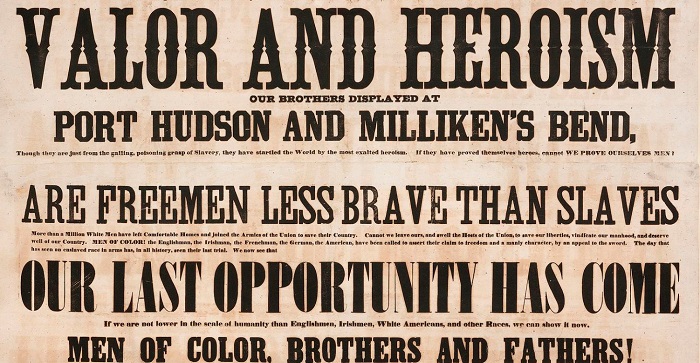Men of Color to Arms

Men of Color to Arms!
The poster above is featured in the online portal for the new Smithsonian National Museum of African American History and Culture (NMAAHC). The broadside was issued on July 6, and prominently mentions both Port Hudson and Milliken’s Bend as examples of black bravery on the battlefield. It is directed to a literate, well-informed, free black population in the North.
Frederick Douglass is attributed as the author of the broadside, and his words, as usual, are powerful. Though the bold headlines grab our attention, the fine print is worth reading:
This is the soil of our birth…If we value liberty, if we wish to be free in this land…we must rise up in the dignity of our manhood and show by our own right of arms that we are worthy to be freemen. Our enemies have made the country believe that we are craven cowards, without soul, without manhood, without the spirit of soldiers. Shall we die with this stigma resting upon our graves?…Let us rather die freemen than live to be slaves. What is life without liberty?…If we would be regarded men…let us rise now and fly to arms!
The poster proudly declares the “Valor and Heroism” of the soldiers at Port Hudson and Milliken’s Bend, and taunts its readers with this declaration and challenge:
Though they are just from the galling, poisoning grasp of slavery, they have startled the World by the most exalted heroism. If they have proved themselves heroes, can we not prove ourselves men? ARE FREEMEN LESS BRAVE THAN SLAVES?
Douglass made it clear that failing to enlist in the Union cause was not just shirking one’s duty, but was a failure to claim manhood. Repeatedly throughout the text of the broadside, Douglass invokes the notion not just of freedom, but of manhood. For too long, blacks had been viewed in the nation, legally and culturally, as “property” – “without soul, without manhood” as Douglass states.”For generations we have suffered under the horrors of slavery, outrage, and wrong. Our manhood has been denied, our citizenship blotted out,… our souls seared and burned.” Now was the time black men could claim and prove before the nation on the public stage of the battlefield, beyond any question, that they were men, brave soldiers, and worthy citizens. It was time to rally; it was time to “prove themselves men.”

Comments
Men of Color to Arms — No Comments
HTML tags allowed in your comment: <a href="" title=""> <abbr title=""> <acronym title=""> <b> <blockquote cite=""> <cite> <code> <del datetime=""> <em> <i> <q cite=""> <s> <strike> <strong>